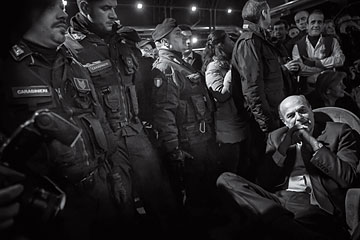
Bersani, bottom right, will need to hold together a center-left coalition to govern in Italy
It speaks volumes about the flakiness of Italian politics that the candidate most likely to emerge as Prime Minister from Italy's elections on Feb. 24 and 25 identifies as his greatest adversary a man who claims not even to be competing for the top job. Pier Luigi Bersani, 61, the leader of the left-of-center Democratic Party, is campaigning as the anti-Silvio Berlusconi, the media tycoon and three-time Premier whose last stint in power ended in November 2011 amid an underage-sex scandal and market turmoil. Berlusconi has told allies that he will not seek to become Prime Minister if his People of Freedom party unexpectedly triumphs later this month. Though technically not the man to beat, the flamboyant 76-year-old remains a potent force in Italian life, a manifestation of a political system that rewards blatant populism and unabashed showmanship.
The balding Bersani, burdened with the downbeat demeanor of a suburban bank manager declining a loan, lacks the tools to fight on those terms. But he's trying to recast his limitations as an advantage. And so, peppering his speeches with words such as seriousness and sobriety, he makes an unusual pitch to lead. "My objective isn't to please," he tells TIME. "My objective is to be believed. Italians have had an overdose of spectacle."
Officials in government offices and financial institutions across Europe second that emotion. Throughout much of 2011, the prohibitive borrowing costs imposed by lenders on the euro zone's third largest economy imperiled attempts to stabilize the European single currency. Mario Monti took over as Prime Minister at the end of 2011, introducing an austerity program to try to reduce the country's unsustainable debt. His measures averted the immediate crisis, but the improvements are fragile. Italy's debt-to-GDP ratio continues to rise, and youth unemployment has reached an all-time high of 37%.
Bleak though the landscape looks, the markets have regained some faith in Italy, enabling its outgoing government to borrow more affordably. But this gain was achieved only by overriding the political system. Monti, a technocrat, was installed in Berlusconi's wake — not elected. The political classes then stood back and let him take responsibility for the painful decisions that politicians prefer to avoid: budget cuts and tax hikes.
Monti, who officially resigned at the end of 2012, has entered the race to be Prime Minister — and voters seem ready to penalize him. He trails in fourth place, behind an angry comedian called Beppe Grillo, whose anti-euro Five Star Movement is tipped to swallow a big slice of protest votes.
Bersani, who leads the latest opinion polls, says he'll build on Monti's reforms. But there are reasons why elected politicians in Italy have so often failed to push through much needed changes. Bersani's history, entwined with his country's, is one of radicalism and compromise, big ambitions operating within a system designed to thwart those ambitions. He may be the best hope for his country — and for the other economies that sicken when Italy sickens — but the real challenge for Bersani will be to make any difference at all.
A 2006 proposal to liberalize the taxi industry illustrates just how resistant Italy can be to reform. Angry cabbies brought Rome to a halt, blockading the streets. Parliamentarians eventually dumped the most important part of the proposal, which would have enabled the creation of taxi fleets rather than restricting the business to owner-drivers.
